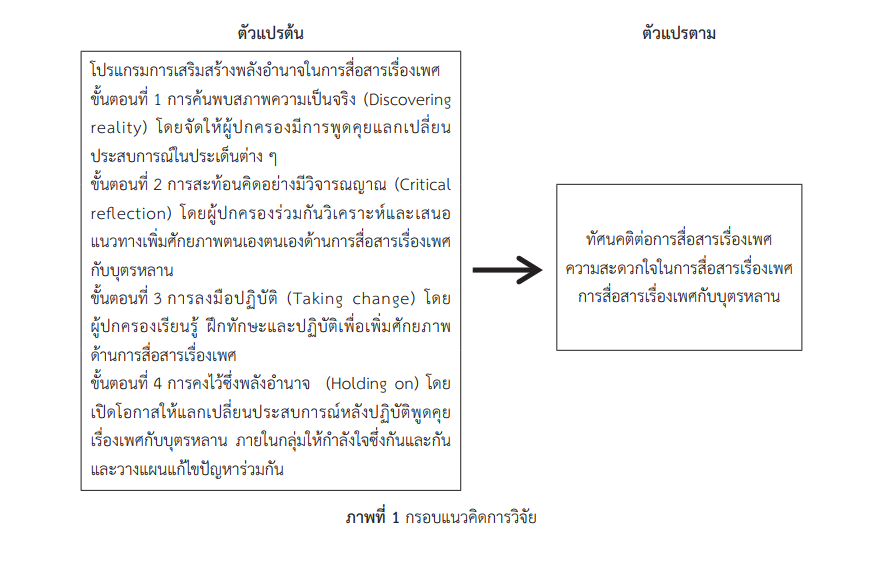ผลของโปรแกรมการเสริมสร้างพลังอำนาจการสื่อสารเรื่องเพศต่อการสื่อสารเรื่องเพศในผู้ปกครองของวัยรุ่นหญิง
คำสำคัญ:
การเสริมสร้างพลังอำนาจ, ทัศนคติ, ความสะดวกใจ, การสื่อสารเรื่องเพศบทคัดย่อ
การศึกษามีวัตถุประสงค์เพื่อศึกษาผลของโปรแกรมการเสริมสร้างพลังอำนาจต่อทัศนคติการสื่อสารเรื่องเพศ ความสะดวกใจในการสื่อสารเรื่องเพศ และการสื่อสารเรื่องเพศของผู้ปกครองของหญิงวัยรุ่นกลุ่มตัวอย่างคือผู้ปกครองเพศหญิงที่มิใช่บิดามารดา อายุ 35- 50 ปีที่รับผิดชอบดูแลบุตรหลานที่เป็นวัยรุ่นหญิงและกำลังเรียนอยู่ชั้นมัธยมศึกษา (ม.1 - ม.3) แบ่งเป็นกลุ่มทดลองและกลุ่มเปรียบเทียบกลุ่มๆละ 13 คน กลุ่มทดลองได้รับโปรแกรมเสริมสร้างพลังอำนาจตามแนวคิดของ Gibson (1995) เก็บรวบรวมข้อมูลด้วยแบบสอบถาม ประกอบด้วย แบบสอบถามข้อมูลส่วนบุคคล ทัศนคติต่อการสื่อสารเรื่องเพศ ความสะดวกใจในการสื่อสารเรื่องเพศ และทักษะการสื่อสารเรื่องเพศ วิเคราะห์ข้อมูลโดยใช้สถิติเชิงพรรณนา ได้แก่ Fisher’s exact test, Dependent t-test และ Independent t-test
ผลการศึกษาพบว่ากลุ่มทดลองมีผลต่างของคะแนนเฉลี่ยทัศนคติเชิงบวกต่อการสื่อสาร ความสะดวกใจในการสื่อสารเรื่องเพศและทักษะการสื่อสารเรื่องเพศสูงกว่ากลุ่มเปรียบเทียบอย่างมีนัยสำคัญทางสถิติ ที่ระดับ .05 (t= 11.594, p<.001; t =2.356, p<.001; t= 8.422, p<.001 ตามลำดับ)
ผลการศึกษาจะเป็นประโยชน์แก่บุคลากรสาธารณสุข ครู และผู้มีส่วนเกี่ยวข้องในการสร้างเสริมศักยภาพในการสื่อสารเรื่องเพศในผู้ปกครองอันจะนำไปสู่การป้องกันปัญหาการมีเพศสัมพันธ์ก่อนวัยอันควรในวัยรุ่นหญิงต่อไป
เอกสารอ้างอิง
Bureau of Reproductive Health. (2014). National Strategic Plan for the Prevention and Resolution of Teenage Pregnancy Issues 2017- 2036. Bangkok: ThepphenVanish. [In Thai]
Bureau of Reproductive Health. (2015). A guide to the organization of family sexual discourse training bureau of reproductive health. Bangkok: ThepphenVanish. [In Thai]
Bureau of Reproductive Health. (2016). Sexual communication skills development manual for teens and Families Bureau of Reproductive Health. Bangkok: ThepphenVanish. [In Thai]
Bureau of Reproductive Health. (2017). Reasons for teenage pregnancy and sexual problems in Thai families Bureau of Reproductive Health. ThepphenVanish. Bangkok. [In Thai]
Flores, D. D., & Barroso, J. J. (2017). 21st century parent-child sex communication in the United States: A process review. Annual Journal of Sex Research, 54, 532-548. https://doi:10.1080/00224499.2016.1267693.
Gibson, C. H. (1993). A study of empowerment in mother of chronically ill children. Unpublished doctoral dissertation. Boston: Boston College.
Gibson, C. H. (1995). Concept analysis of empowerment. Journal of Advance Nursing, 16(3), 354-361.
Heednakram, U., Kasatpibal, N., & Viseskul, N. (2015). Effect of parent communication Skill development on communication about HIV prevention between parents and early adolescents. Nursing Journal, 42(1), 13-24. [In Thai]
Huansri, K., Saksongmuang, P., Purintaraphiban, C., & Thansuwan, C. (2021). Effects of positive sexual communication promotion activities on efficacy in family communication of parents with adolescent children. Journal of Health Science, 15(1), 47-57. [In Thai]
Maneesuwan, W., Lagampan, S., & Pawwattana, A. (2018). Life skill development program to prevent teenage pregnancy among early adolescent girls in foster homes. Kuakarun Journal of Nursing, 8(3), 37-57. [In Thai]
Ministry of Social Development and Human Security. (2022). Statistics on Adolescent Births Thailand 2021. Bureau of Reproductive Health. Bangkok. [In Thai]
Path2health Foundation. Curriculum. (2014). Parent-Child Communication to Promote Adolescent Sex Health. Thai Health Promotion Foundation. Bangkok. [In Thai]
Powwattana, A., & Thammaraksa, P. (2018). The effect of learning resources in the development of sexual communication among mothers and adolescent. Journal of Health and Nursing 2018, 34(1), 58-70. [In Thai]
Rogers, K., Gorna, R., McDougall, L., & Toure, K. (2016). The Global strategy for women’s, children’s and adolescents’ health (2016–2030): A roadmap based on evidence and country experience. Bull World Health Organ, 9(4), 398–400.
Samutachak, B., Khumsuwan, K., & Nittannara, P. (2018). The vulnerable families in the situation of demographic and social changes in Thailand. Thailand Science Research and Innovation. Bangkok: Mahidol University [In Thai]
Suvarnakuta, P., Ongkhaow, T., & Nungalee, S. (2018). The effect of promoting communication about sex program on feeling comfortable and practice in communication about sex between early female adolescents and mothers. Journal of Nursing and Education, 10(4), 63-75. [In Thai]
Thipsungwan, K., Srisuriyawet, R., & Homsin, P. (2013). Effects of mother-participating program on sexual communication between mother and early female adolescents. The Public Health Journal of Burapha University, 8(2), 70-80. [In Thai]
Wang, B., Stanton, B., Deveaux, L., Li, X., Koci, V., & Lunn, S. (2014). The impact of parent involvement in an effective adolescent risk reduction intervention on sexual risk communication and adolescent outcomes. AIDS Education and Prevention. 26(6), 500 – 520.
Ward, L. M., & Wyatt, G. E. (2016). Parent- adolescent communication about sexuality in Chinese families. Journal of Family Communication, 16(3), 229-246.
Thiangtham, W. (2015). Community capacity building: concept and application. (4th ed.)
Bangkok: Mahidol University. [In Thai]
Wongsawat, P., Supametaporn, P., & Hoyrat, P. (2017). Effectiveness of learning program for improving sexual communication skills among parents and their adolescent children on premarital sexual and unwanted pregnancy prevention. Journal of Boromarajonani College of Nursing, 35(1), 86-98. [In Thai]

ดาวน์โหลด
เผยแพร่แล้ว
รูปแบบการอ้างอิง
ฉบับ
ประเภทบทความ
สัญญาอนุญาต

อนุญาตภายใต้เงื่อนไข Creative Commons Attribution-NonCommercial-NoDerivatives 4.0 International License.




